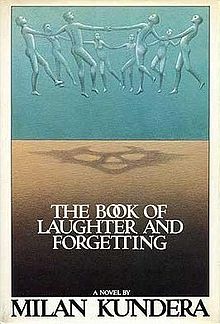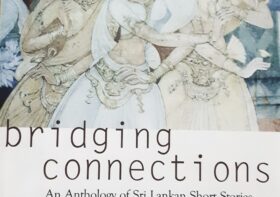The Book of Laughter and Forgetting – Milan Kundera

వ్యాసకర్త: Nagini Kandala
***********
మనుష్య జీవితంలో విస్మృతి అనేది సర్వసాధారణమే, కానీ ఆ మరపు సహజసిద్ధంగా జరిగే ప్రక్రియలా కాకుండా, ఒక సమాజం ప్రయత్నపూర్వకంగా తన స్వార్థ ప్రయోజనాల దృష్ట్యా కాలం నిర్వర్తించాల్సిన పనిని తన చేతుల్లోకి తీసుకుని గతాన్ని చరిత్రలో నుంచి చెరిపేసి ప్రయత్నం చేస్తే, అంతవరకూ ఆ అనంతమైన స్మృతిపథాల్లో తమ అస్థిత్వం ముడిపడి ఉందని భావించే మనుషుల జీవితాలు మళ్ళీ తెల్లకాగితాల్లా మిగిలిపోయి, వాళ్ళు అటు గతాన్ని వదల్లేక ఇటు తమది కానీ వాస్తవంలో బ్రతకలేక పడే యాతనకు కాల్పనికతను జోడించి magical realism శైలిలో అక్షర రూపాన్నిచ్చారు Czechoslovakia రచయిత Milan Kundera. 1979 లో తొలి ముద్రణ వచ్చాకా ‘The book of laughter and forgetting’ ను Michael Henry Heim ఆంగ్లీకరించగా, మరో ప్రసిద్ధ రచయిత Philip Roth ఎడిట్ చేశారు. Kundera నిజానికి Czech పౌరుడైనప్పటికీ, దేశబహిష్కరణకి గురై ఫ్రాన్స్ లో స్థిరపడి ఫ్రెంచ్ భాషలో ఆయన అనేక రచనలు ముద్రణకు నోచుకున్న కారణంగా తనను తాను ఒక ఫ్రెంచ్ రచయిత గా చెప్పుకుంటారు.
చరిత్ర లో అనేక ముఖ్యమైన ఘట్టాలు కాలగర్భంలో కలిసిపోతాయి. నిజానికి కలిపెయ్యబడతాయి. స్వార్థంతో, అధికారదాహంతో ఒక సంస్కృతినీ, ఒక నాగరికతనీ, ఒక దేశాన్నీ సమూలం గా చరిత్ర పుటల్లోంచి వేరు చేసే ప్రయత్నం చేస్తున్నప్పుడు, ఆ సమాజానికి చెందిన మనిషి ఉనికి అతనికే ప్రశ్నార్థమైన పరిస్థితుల్లోంచి పుట్టుకొచ్చిన కథలు ఇవి. నవల మొదట్లో Czech దేశానికి సంబంధించి ప్రాముఖ్యతను సంతరించుకున్న ఒక చారిత్రాత్మక ఘట్టం గురించి చెప్పడంతో కథ మొదలవుతుంది. February 1948 లో కమ్యూనిస్ట్ లీడర్ అయిన Klement Gottwald Prague లో Old Town Squareలోని Baroque palace బాల్కనీ నుంచి కొన్ని వేలమంది ప్రజలనుద్దేశించి ప్రసంగించారు. రష్యన్ చొరబాటుతో Czech కమ్యూనిస్ట్ దేశంగా ఆవిర్భవించిన కీలక సందర్భం అది. చలికాలం, అందునా Gottwald తలమీద టోపీ లేక మంచు పడడంతో ప్రక్కనే ఉన్న Vladimír Clementis తన తలమీద ఉన్న fur cap ను తీసి ఎంతో concern తో Gottwald తలమీద ఉంచారు. ఆ టైం లో తీసిన ఫోటో Czech చరిత్రలో ప్రతివారికీ సుపరిచితమే. పిల్లల text books మొదలు ప్రతిచోటా ఆ ఫోటో దర్శనమిచ్చేదట. కానీ ఇది జరిగిన సరిగ్గా నాలుగేళ్లకు Clementis ను దేశద్రోహం నేరం మీద ఉరి తీశారు. దానితో పాటు Czech చరిత్రలో కీలకమైన ఆ ఫోటో నుండి కూడా Clementis ని తప్పించారు. 1968 లో రష్యన్ చొరబాటుతో Prague Spring గా పిలవబడే ఈ సమయంలో అప్పటి రాజకీయ పరిస్థితులు సామాన్యుని జీవితంలో ఎలాంటి పెనుమార్పుల్ని తీసుకొచ్చాయో వివరిస్తారు Milan Kundera. ఆ తరువాత సుమారు 41 సంవత్సరాల పాటు Czech రష్యన్ అథారిటీ క్రిందే ఉంది.
కమ్యూనిజం Czech లో వేళ్లూనుకుంటున్న ఆ రోజుల్లో కొందరు వ్యక్తులు తాము నమ్మిన సిద్ధాంతాలను సమాజ శ్రేయస్సు దృష్ట్యా తొలుత అమలు పరిచి ఒక పాలన తీసుకొచ్చాక, మళ్ళీ ఆ సమాజంలో కూడా అవే పరిస్థితులు పునరావృతం అయితే, మళ్ళీ ఆ సిద్ధాంతాలను పునఃపరిశీలించుకుని తమ circle కి తామే ఎదురు తిరగాల్సివచ్చినప్ప్పుడు ఆ వ్యక్తుల్ని ఆ సమాజం దేశద్రోహులుగా ముద్ర వేసి జైలుపాలు చేసింది. కొందర్ని దేశబహిష్కరణకు గురి చేసింది, మరి కొందరినైతే ఉనికే లేకుండా చేసింది. ఇందులో రచయిత, ఒకే నేపథ్యంలో రాసిన ఏడు కథలను తన స్వానుభవాల, మనోభావాల సమాహారంగా మలిచారు. Narration ఫస్ట్ పర్సన్ లోనే ఉంటుంది. ఈ కథా సంకలనాన్ని categorize చెయ్యడం కష్టం, ఎందుకంటే ఇందులో ఆయన చర్చించని విషయమంటూ ఉండదు. మొదట్లో రాజకీయపరమైన వివరణలతో మొదలుపెట్టి మెల్లిగా ఫిలాసఫీ, అస్థిత్వ వాదం, ప్రేమ, ఐడెంటిటీ, తాత్విక వాదం, శృంగారం ఇలా పలు అంశాలను స్పృశిస్తూ ముందుకు వెళ్తారు. Czech దేశ పౌరుడిగా, ఆ యువతకు ప్రతినిధిగా తన అస్థిత్వాన్ని ప్రశ్నించుకునే రచయిత అనుభవాలు మనకు musings లా అనిపిస్తాయి. ఇందులో ఒక ప్రత్యేకత ఏంటంటే, ప్రతి కథా దేనికి దానికి విడి విడిగా ఉంటాయి, కానీ చివర్లో చూస్తే అన్నీ కూడా ఒక దానికొకటి interlinked గా ఒకే కథగా అనిపిస్తాయి. అన్నిటిలోను common గా కనిపించే విషయాలు టైటిల్ ని justify చేసే హాస్యము మరియు విస్మృతి. ఈ రెండిటినీ metaphors గా వాడారు. ఈ కథల్లో Laughter అంటే irony, Forgetting అంటే sadness ధ్వనిస్తాయి. మొదటి కథ Lost Letters లో తన గతాన్ని చెరిపెయ్యాలని Mirek చేసే వ్యర్థ ప్రయత్నం కనిపిస్తే, మరో కథలో విధవరాలైన Tamina తన భర్త తాలూకు గతం తన జ్ఞాపకాల్లోంచి చేజారనివ్వకూడదనే తపన కనిపిస్తుంది.
She has no desire to turn the past into poetry, she wants to give the past back its lost body. She is not compelled by a desire for beauty, she is compelled by a desire for life.
There she sits on a raft, looking back, looking only back. The sum total of her being is no more than what she sees in the distance, behind her. And as her past begins to shrink, disappear, fall apart, Tamina begins shrinking and blurring.She longs to see the notebooks so she can fill in the fragile framework of events in the new notebook, give it walls, make it a house she can live in. Because if the shaky structure of her memories collapses like a badly pitched tent, all Tamina will have left is the present, that invisible point, that nothing moving slowly toward death.
మళ్లీ మరో కథలో అదే తమీనా ఒక దీవిలో చిన్న పిల్లల మధ్య Odd man out లా బ్రతకాల్సి రావడం అంతర్లీనంగా Prague హిస్టరీని metaphorical way లో వివరిస్తారు. ఇంకో కథ ‘Mother’ లో Marketa అనే ఆమె భర్తతో intimate గా ఉండే సమయంలో తల లేకుండా అతన్ని ఊహించుకునే కథలో ‘absence of soul’ గురించి రాశారు. మరో కథలో inferiority కాంప్లెక్స్ ఉన్న ఒక యువకుడు తన అస్థిత్వాన్ని గురించి ఆలోచించే కథలో existential క్రైసిస్ కనిపిస్తుంది. ఇలా ఒక వైపు వైరుధ్యాన్ని, మరోవైపు సారూప్యాన్ని ఏక కాలంలో సమన్వయం చెయ్యడంలో Milan Kundera ప్రతిభ ప్రతి అక్షరంలోనూ కనిపిస్తుంది. చివరి కథ The Border ఒక్కటే మిగతా కథలకంటే చాలా వేరుగా ఉంది, నాకు పెద్దగా నచ్చలేదు.
ఒక సందర్భంలో రైటింగ్ గురించి చెప్తూ రాసిన ఈ విషయాలు చాలా ఇంట్రెస్టింగ్ గా ఉన్నాయి,
Novels are the fruit of the human illusion that we can understand our fellow man.
The only thing we can do,” said Banaka, “is to give an account of our own selves. Anything else is an abuse of power. Anything else is a lie”
“Ever since Joyce,” he said, “we have been aware of the fact that the greatest adventure in our lives is the absence of adventure. Odysseus fought at Troy, made his way home on a ship he himself piloted, had a mistress on every island—no, such is not the life we live. Homer’s Odyssey now takes place within man. Man has internalized it. The islands, the sea, the sirens seducing us, and Ithaca calling us home—they have all been reduced to voices within us.
“Right! Look at me from the outside and I don’t seem special. From the outside! Because it’s what goes on in me, on the inside, that’s worth writing about, that people will want to read about.
The episode of Banaka pointing to his chest and crying out of existential anguish reminds me of a line from Goethe’s West-East Divan: “Is one man alive when others are alive?” Deep within Goethe’s query lies the secret of the writer’s creed. By writing books, the individual becomes a universe (we speak of the universe of Balzac, the universe of Chekhov, the universe of Kafka, do we not?). And since the principal quality of a universe is its uniqueness, the existence of another universe constitutes a threat to its very essence.
లిటరరీ మ్యాగజైన్స్ లో వచనం గురించి చెప్తూ లిరికల్/ పొయెటిక్ narration అని వర్ణిస్తూ ఉంటారు, ఆ ఫీల్ తీసుకురావడంలో నిరాశపరిచిన పుస్తకాలు కొన్ని ఉన్నాయి. కానీ Milan Kundera ని చదివాక ‘అంటే ఇలాంటి పుస్తకమన్నమాట’ అనుకున్నాను. ఎక్కడా దారం అనేదే కనిపించకుండా చిక్కగా కట్టిన మల్లెచెండు లాంటి వర్ణన అది. కొన్ని పుస్తకాలు ఆడుతూ పాడుతూ చదివెయ్యొచ్చు, వారు చెప్పాలనుకున్న విషయాన్నికొంచెం తేలికైన వచనంతో మన బ్రెయిన్ తీసుకునే distraction gapsని కూడా క్షమించేసే రచయితలు ఉంటారు. కానీ ఈయన ఈ విషయంలో పరమ కర్కోటకుడు. ఆయన చెప్తున్నది పూర్తిగా మన మెదడులో రిజిస్టర్ కావాలంటే ఒక్క అక్షరం కూడా పొల్లుపోనివ్వకుండా, పూర్తి అట్టెన్షన్ తో చదవాల్సిందే. అలా అని ఇందులో అర్థంకాని పెద్ద పెద్ద వ్యాఖ్యానాలు ఉండవు. పొదుపైన పదాలతో తన అద్భుతమైన narrationతో ఆపకుండా చదివించగలిగే సత్తా ఉన్న రచయిత Milan Kundera. చదువుతున్నంతసేపూ ఆ metaphorical narration గురించి ‘ఆహా’ అనుకోని సందర్భం ఉండదు. హ్యూమన్ Consciousness ని కూడా layers లో చూస్తే Kundera ముట్టుకోని లేయర్ లేదనే చెప్పాలి. కొన్ని అంశాల్లో అవధుల్లేని ఆయన intellectual streak మనల్ని ఆశ్చర్య పరుస్తుంది. ఇది అవ్వడానికి 263 పేజీల పుస్తకమే అయినా,కంటెంట్ క్వాలిటీ దృష్ట్యా కాస్త భారీగానే అనిపించింది. పుస్తకం చదివేటప్పుడు ఇష్టమైన లైన్స్ మార్క్ చేసుకునే అలవాటులో, చివర్లో చూస్తే దాదాపు చాలా శాతం పుస్తకం మార్క్ చేశాను.
ఈ రచన లో మూలవస్తువు Czech రాజకీయ సామాజిక పరిస్థితులు కావడంతో మొదట్లో Czech చరిత్ర గురించి కాస్త తెలుసుకోవలసి వచ్చింది. రెండేళ్ల క్రితం చదివిన ఒక అద్భుతమైన పొలిటికల్ సెటైర్ George Orwell రాసిన Animal Farmకీ దీనికీ చాలా పొంతనలు ఉన్నాయి. కానీ తేడా ఏంటంటే Orwell రచన ఒక surface మీద సాగితే ఈయన రచనలో విశ్లేషణలు మరింత లోతుగా ఉంటాయి. కానీ ఇది కూడా Animal Farm లాగానే కాలదోషం పట్టని రచన, ప్రతి సమాజానికీ అన్వయించుకోవచ్చు. నా విషయంలో ఒకే రచయిత రాసిన రెండో పుస్తకం వరుసగా చదవడం బహు అరుదు (ఠాగోర్ పూర్తిగా exception అనుకోండి) కానీ Coetzee తరువాత మళ్ళీ ఇంతకాలానికి ఈయన రాసిన మరో పుస్తకం వెంటనే చదవాలి అనిపించిన రచయిత Milan Kundera మాత్రమే. మొదట ఆయన ప్రముఖమైన నవల ‘The unbearable lightness of being’ చదువుదామనుకుని, మొదటి సారి కదా,ఆ టైటిల్ అంత భారీగా ఉంది కొంచెం తేలిక పాటి రచనతో మొదలు పెడదాం అని ఇది చదివిన నేను ‘Don’t judge a book by its title’ అని మరో పాఠం నేర్చుకున్నాను.
పుస్తకం చివర్లో Philip Roth రచయితను చేసిన ఇంటర్వ్యూ చాలా బావుంది. ఆయన అందులో ఒక ప్రశ్నకు చెప్పిన సమాధానంలో చివరి రెండు లైన్స్ అద్భుతం.
PR: Is this, then, the furthest point you have reached in your pessimism?
MK: I am wary of the words pessimism and optimism. A novel does not assert anything; a novel searches and poses questions. I don’t know whether my nation will perish and I don’t know which of my characters is right. I invent stories, confront one with another, and by this means I ask questions. The stupidity of people comes from having an answer for everything. The wisdom of the novel comes from having a question for everything.
ఈ పుస్తకం నుంచి నచ్చిన లైన్స్ కొన్ని:
Mirek says that the struggle of man against power is the struggle of memory against forgetting.
He airbrushed her out of the picture in the same way the Party propaganda section airbrushed Clementis from the balcony where Gottwald gave his historic speech. Mirek is as much a rewriter of history as the Communist Party, all political parties, all nations, all men. People are always shouting they want to create a better future. It’s not true. The future is an apathetic void of no interest to anyone. The past is full of life, eager to irritate us, provoke and insult us, tempt us to destroy or repaint it. The only reason people want to be masters of the future is to change the past. They are fighting for access to the laboratories where photographs are retouched and biographies and histories rewritten.
Literature is a system of signs.
Whereas the Devil’s laughter pointed up the meaninglessness of things, the angel’s shout rejoiced in how rationally organized, well conceived, beautiful, good, and sensible everything on earth was.
Laughable laughter is cataclysmic. And even so, the angels have gained something by it. They have tricked us all with their semantic hoax. Their imitation laughter and its original (the Devil’s) have the same name. People nowadays do not even realize that one and the same external phenomenon embraces two completely contradictory internal attitudes. There are two kinds of laughter, and we lack the words to distinguish them.
సమాజాన్నీ,అథారిటీని ఒక circle గా చూపిస్తూ చేసిన విశ్లేషణ. .
Then one day I said something I would better have left unsaid. I was expelled from the Party and had to leave the circle.That is when I became aware of the magic qualities of the circle. Leave a row and you can always go back to it. The row is an open formation. But once a circle closes, there is no return.It is no accident that the planets move in a circle and when a stone breaks loose from one of them it is drawn inexorably away by centrifugal force. Like a meteorite broken loose from a planet, I too fell from the circle and have been falling ever since. Some people remain in the circle until they die, others smash to pieces at the end of a long fall. The latter (my group) always retain a muted nostalgia for the circle dance. After all, we are every one of us inhabitants of a universe where everything turns in circles.
We shall flee rest, we shall flee sleep, We shall outstrip dawn and spring And we shall fashion days and seasons To the measure of our dreams.
A man possessed by peace never stops smiling.
Kundera దృష్టి లో స్త్రీ. .”A mismatched outfit, a slightly defective denture, an exquisite mediocrity of the soul—those are the details that make a woman real, alive. The women you see on posters or in fashion magazines—the ones all the women try to imitate nowadays—how canthey be attractive? They have no reality of their own; they’re just the sum of a set of abstract rules. They aren’t born of human bodies; they hatch ready-made from the computers.
“The first step in liquidating a people,” said Hubl, “is to erase its memory. Destroy its books, its culture, its history. Then have somebody write new books, manufacture a new culture, invent a new history. Before long the nation will begin to forget what it is and what it was. The world around it will forget even faster.
Love is a constant interrogation. In fact, I don’t know a better definition of love.
Man knows he cannot embrace the universe with all its suns and stars. But he finds it unbearable to be condemned to lose the second infinity as well, the one so close, so nearly within reach. Tamina lost the infinity of her love, I lost my father, we all lose in whatever we do, because if it is perfection we are after, we must go to the heart of the matter, and we can never quite reach it.
Being a corpse struck her as an unbearable disgrace. One minute you are a human being protected by modesty—the sanctity of nudity and privacy—and the next you die, and your body is suddenly up for grabs. Anyone can tear your clothes off, rip you open, inspect your insides, and—holding his nose to keep the stink away—stick you into the deepfreeze or the flames.
But I feel Jan is wrong in thinking that the border is a line dissecting man’s life at a given point, that it marks a turning point in time, a definite second on the clock of human existence. No. In fact, I am certain the border is constantly with us, irrespective of time or our age; external circumstances may make it either more or less visible, but it is omnipresent.




varaprasaad.k
సమీక్ష చాలా బావుంది.కంటెంట్ మరింత విపులీకరిస్తే మరీ బావుండేది.